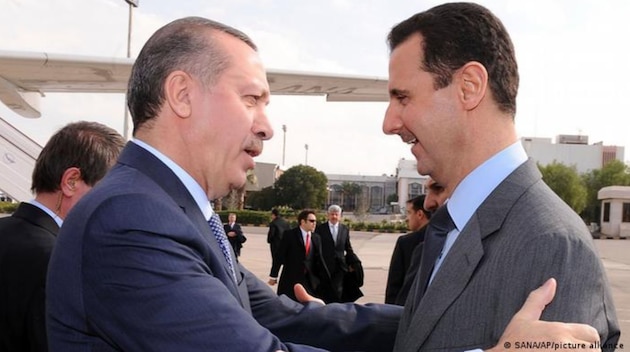Hardly a day goes by without the Turkish media publishing the latest survey results on expected voting behavior. The government is still reluctant to announce the exact date of the elections, and for tactical reasons the opposition is withholding the name of the common opponent. Meanwhile, the opinion polls in the government camp are causing anything but a storm of joy. Recep Tayyip Erdogan, who has been in power for twenty years, has his back to the wall, and scenarios about a possible election defeat are making the rounds.
The President and his government are bucking the trend with a variety of initiatives. This political activism is not uncommon in the run-up to important elections. It’s not just about economic policy, which is the focus of the election campaign in view of the crisis-ridden developments of recent years.
Foreign policy also plays an important role in the struggle for voters’ favor: President Erdogan is a master at using foreign policy for domestic political purposes. In addition to the high-profile appearances on the stage of international diplomacy, for example as a mediator between the warring parties in Ukraine, Syria policy has increasingly come into focus in recent weeks.
It is not the first time that the Turkish ruler has taken initiatives towards the neighboring Arab country for domestic reasons. “Syria has a unique place in Erdogan’s political survival strategy,” writes Gönül Tol in a recent book entitled Erdogan’s War. The struggle of a power man at home and in Syria”, in which the author explains on 300 pages how Erdogan’s Syria policy is decisively determined by his domestic political interests.
For several weeks now, there have been increasing indications of what can only be described as a radical about-face in Turkey’s attitude towards the regime in Damascus. At the beginning of the year, President Erdogan spoke again – and more clearly than before – about the possibility of a direct meeting with the Syrian dictator Bashar al-Assad. A Turkish-Syrian summit would be the culmination of a process that has been going on behind the scenes in Moscow for months, at the end of which the normalization of relations between Ankara and Damascus is expected.
Apparently, this process is well advanced: Shortly before the turn of the year, a meeting of the defense ministers of Turkey, Syria and Russia took place in the Russian capital. Turkish Foreign Minister Mevlut Cavusoglu has now announced that a meeting of the three foreign ministers is to follow in February, at which the foundations for the planned summit between Assad and Erdogan are to be laid out.
The diplomatic drama of a tête-à-tête at the highest level would be significant. In the course of the Syrian war that has been raging for more than ten years, Turkish-Syrian relations have completely collapsed. At Erdogan’s instigation, Turkey became the opposition’s most important supporter and at times the most important deployment area for the armed opponents of Assad. On the other hand, Putin’s Russia was and remains Assad’s most important support. This circumstance alone may explain Moscow’s special interest in a Syrian-Turkish settlement.
A summit meeting between Assad and Erdogan would be a political triumph for Vladimir Putin – and a defeat for the Americans.
Washington, which is fighting alongside Kurdish militias against “Islamic State” in Syria, much to Turkey’s displeasure, has made no secret of the fact that it rejects normalization of relations with the Assad regime: “We do not support normalization,” they say it succinctly as a reaction to the current developments in the action triangle Moscow – Ankara – Damascus.
The American admonition obviously made little impression on Erdogan: In Syria policy, the Turkish president is listening to Putin and not to Joe Biden these days, that much is certain.
According to media reports, the political basis of an emerging Turkish-Syrian agreement is a special kind of barter transaction: In return for Ankara’s recognition of Assad as ruler of Syria and the normalization of bilateral relations at all levels, Damascus is said to have committed itself to the Kurdish structures in northern Syria and to ensure that they do not play a role in future peace negotiations.
For Erdogan, whose decisions are increasingly being driven by opinion polls, such a deal with the Syrian dictator might be the key to success at the polls.
Surveys show that after the economic crisis, the approximately four million Syrian war refugees in Turkey are the most important issue for people. Little is left of the initial “welcome culture” in Anatolia; a large majority of Turks would rather see the Syrians go today than tomorrow. This negative attitude has just been confirmed again by a survey. The current edition of the “Syrians Barometer”, an ongoing study by the political scientist Murat Erdogan, which compiles the latest findings on Syrians in Turkey at regular intervals, also shows that around 70 percent of those surveyed are dissatisfied with the government’s Syrian policy. When it comes to migrants from the neighboring country, Erdogan has his back to the wall.
A political agreement with Assad that stipulates Turkey’s demand for the return of the refugees, as well as a contract that would seal the end of the Kurdish militias in the Syrian border area, would be a political godsend for Erdogan so shortly before the elections.
Author: Ronald Meinardus (Athens)
As the American “Vogue” reports, the supermodel Tatjana Patitz died. She was 56 years old.
When I read the police report today, I was honestly shocked: It said there were families with small children among the occupiers of the lignite town of Lützerath. Small children? In the battle zone against global warming! Are you crazy?
The original of this article “The key to Erdogan’s re-election may lie in Damascus – and in Moscow” comes from Deutsche Welle.
















































